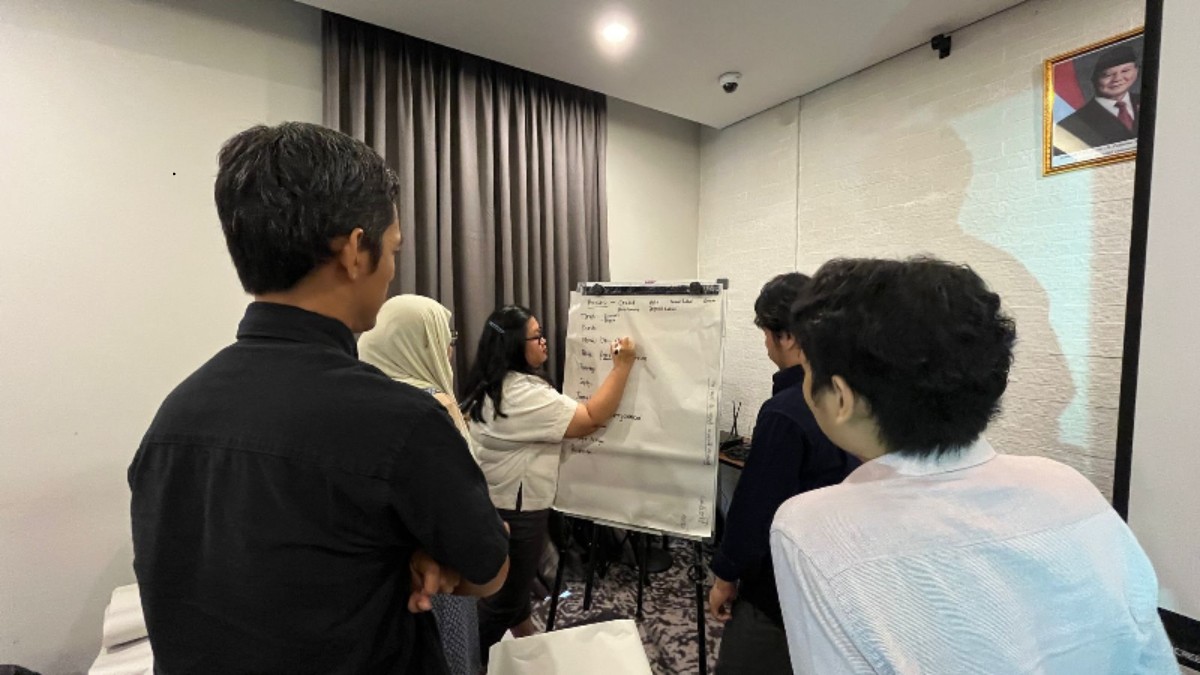25 August 2025 5 menit
Green Labels, Hidden Wounds: Exposing RSPO and EUDR in the Palm Oil Debate

TuK INDONESIA concluded its training of trainers on 29–30 July 2025 in Bogor. Although TuK INDONESIA’s decades-long experience has found that the complaint mechanism behind the RSPO is slow, convoluted, and often fails to advocate for affected communities, TuK decided to continue initiating a discussion around it. The simple reason: grassroots communities need to understand how global regulations work, both their opportunities and their pitfalls, so that they can be better prepared to defend their rights when circumstances call for it.
The training session was attended by several civil society representatives from Sumatra, Java, and Kalimantan. Participants not only learned about palm oil sustainability rules through policy frameworks, but also shared stories brought in from the field. They closely examined the RSPO and EUDR, and tested how far their complaint mechanisms can really be relied upon.
TuK INDONESIA opened the training introducing the RSPO. Participants learned about the principles, criteria, and complaint system of the global certification organization. At first glance, the mechanism was seen as a useful tool to be used in palm oil advocacy. However, further in the assessment, criticisms began surfacing. Years of experience have shown that the RSPO, despite carrying the “sustainable” label, often ends up failing to stop destructive practices on members’ concessions, such as clearing of primary forests and peatland logging even when they are already certified as sustainable.
TuK INDONESIA has tested the mechanism in the course of palm oil advocacy. Unfortunately, it has not been able to address the problems that appear in practice on the field. Linda Rosalina, Executive Director of TuK INDONESIA, recounted the long processes they have been through. “We have submitted several complaints through the RSPO mechanism, for example concerning land conflicts or environmental damage, but they often end in a long process without real remedies for affected communities,” said Linda. Practices like this, TuK warned, risk turning RSPO into a tool of legitimacy — not protection, but rather greenwashing, a “green” image that deflects criticism without solving the problems it claims to.
In the context of human ecology, palm oil itself presents a paradox. On the one hand, it brings benefits through basic infrastructure, jobs, and economic access to remote villages. But on the other hand, industry expansion often swallows customary forests, pollutes rivers, damages the environment, and sparks social conflict. Many Indigenous people are criminalized when resisting new land clearing. The impact: loss of living space, land rights, and security, especially for environmental and human rights defenders in their villages.
Meanwhile, on the other side of the world, consumers in big cities or distant continents never see this landscape of conflict. They only see the final products — soap, shampoo, margarine, biscuits, cosmetics, or biodiesel — without knowing that each product carries a long trail of violations and damage hidden behind the label “sustainable vegetable oil.”
Then comes the European Union Deforestation Regulation (EUDR), which seems like a way out of the current predicament. But the more it is reviewed, the clearer it becomes that this regulation is little more than posturing for good intentions — virtue-signaling — without traces of real justice. For many observers and stakeholders in the Global South, EUDR actually replicates a colonial pattern where developed countries impose high standards on nations whose services they have long enjoyed, without providing proportional support.
According to Prof. Budiman Minasny of the University of Sydney, the EUDR often burdens smallholders, especially since traceability rules on geolocation and full documentation are heavy tasks that only large companies can meet.1https://www.antaranews.com/berita/4378378/eudr-dan-dampaknya-bagi-petani-indonesia Unsurprisingly, Gapki has also warned that rules like this could shut small farmers out of the market, while they lack the resources to comply.2https://www.antaranews.com/berita/4417953/gapki-eudr-lebih-merugikan-petani-kecil-dibandingkan-pengusaha-sawit On a more conceptual level, EUDR is called an instrument of green neo-imperialism, in which the European Union sets unilateral rules without substantive dialogue, dictating how other countries should farm and protect forests, even though the EU itself was a major driver of past deforestation.3https://id.epiccproject.org/blog/2024/09/19/neokolonialisme-yang-tertanam-dalam-regulasi-produk-bebas-deforestasi-eudr-uni-eropa/
The RSPO, with all its mechanisms, has proven insufficient to answer the cries of people whose lands and forests are taken from them. Complaint processes are often long, exhausting, and frequently end without real solutions. Meanwhile, the EUDR, set to take effect in 2026, presents a new threat: smallholders may be pushed aside because they cannot meet the high standards set from abroad.
Even so, a small flame of hope lingers. This training session was not only a learning space about certificates or regulations. More than that, it was a place to prepare local trainers who will later return to their communities, becoming guardians of people’s rights and voices of grassroots advocacy. Big questions also echoed in the room: Do certificates really stop destruction? Or do they only enrich investors, while small farmers are increasingly marginalized?
This training is expected to serve as a call to trace not only supply chains, but also the root causes of all this destruction. Because without justice and community participation, RSPO and EUDR are nothing more than empty green labels that soothe distant consumers’ hearts, while still shutting their ears to the cries of communities living amid the oil palm plantations.
This post is also available in: Indonesian
